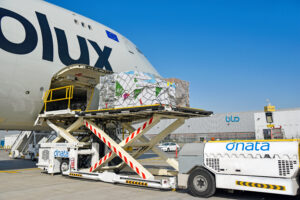Dec 04, 2023

Serving 159 airlines in cargo and moving 2.7 million tonnes of goods per year, dnata provides an extensive suite of services out of its Dubai base including: warehousing and equipment supply, export cargo acceptance and flight build up, import cargo flight breakdown and delivery, customs control, transfer and transit and mail handling.
These operations have seen dnata become part of the regional ecosystem that has led Dubai and the UAE grow into a global trading hub, as the country moves toward its 2033 vision.
“You get out of this community what you put in,” Guillaume Crozier, dnata’s Head of Global Cargo Strategy, explained, “We are full steam ahead to activate all the plans to reach our goals. It’s about increasing capacity, increasing product portfolio and covering all the requirements of the logistic chain.”
Power of partnerships
Working in the supply chain requires key connectivity to ensure smooth transition of goods from A to B with care and speed. While dnata benefits from the quality of infrastructure in Dubai that has made it a key location in the cargo sector, not every destination has the same facilities, risking shipping standards.
One dnata was launched in 2011, meaning that they have minimum standards everywhere within our network. It’s not about having the full set of services on offer in all locations but being able to guarantee what service customers can expect and promise on their end.
“I think, with that approach, it’s really realistic and practical. It’s all about a clear framework and assurances behind it and having a strong product offering the systems in place for both ensuring the quality but also preparation,” Crozier explained.
With that in mind, dnata has been focusing on its abilities around data, making big investments in the sphere, boosting data architecture, governance and models to provide the best possible picture for customers.
“We increase the integrity and quality of our data to provide very strong transparency in the supply chain, something that’s extremely important when it comes to specific products,” Crozier said.
Greener vision
Sustainability has come to the fore in the logistics as companies look to minimise their carbon footprint while expanding operations. dnata has put that into practice in its hubs, electrifying activities where possible to cut down on the impact of on-the-ground services.
“Sustainability is becoming more and more important and everyone is looking at the same direction,” Crozier said.
In terms of sustainability, dnata’s aim is to reduce 20% of emissions by the end of 2024 and 50% by 2030.
“As long as you have clear, tangible KPIs, you have a starting point that can lead you to a good global approach,” Crozier added.
Innovation plays a role in this evolution to a greener industry, using data to ensure that operations are as efficient as possible.
“It’s very important as a community that we join forces to set up clean data model across the industry that everyone can participate in whatever the level of maturity,” Crozier highlighted.
Opportunities and priorities
Looking to continue its growth in the airfreight space, dnata has identified the Asia-Pacific region and Africa as a potential target for expansion. However, for dnata, it’s not just about increasing the size of their network but ensuring they achieve a high standard of service wherever they work with customers.
“We are looking at all the opportunities and there are a lot. But what we really want is to be the most admired,” Crozier stated. “We want to deliver on the promises we make to our customers. That’s why we put a lot of focus on offering a robust blueprint to serve the customer. That’s our top priority.”
Growth is a two-way street for dnata, where they work with customers to understand their goals and how the two can work in tandem to move forward.
“Our customers make more and more promises and new policies, which lead us to increase our capability on the ground with more logistic capability, visibility and efficiency,” Crozier continued. “We’ve done a lot in terms of processes. It’s a continuous improvement. It’s about lean methodology that we’ve implemented on our organisation.”
The post Navigating the future of global logistics from Dubai appeared first on AIR CARGO WEEK.
Go to Source
Author: Edward Hardy




